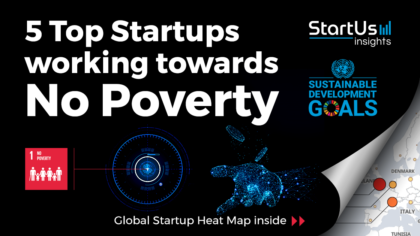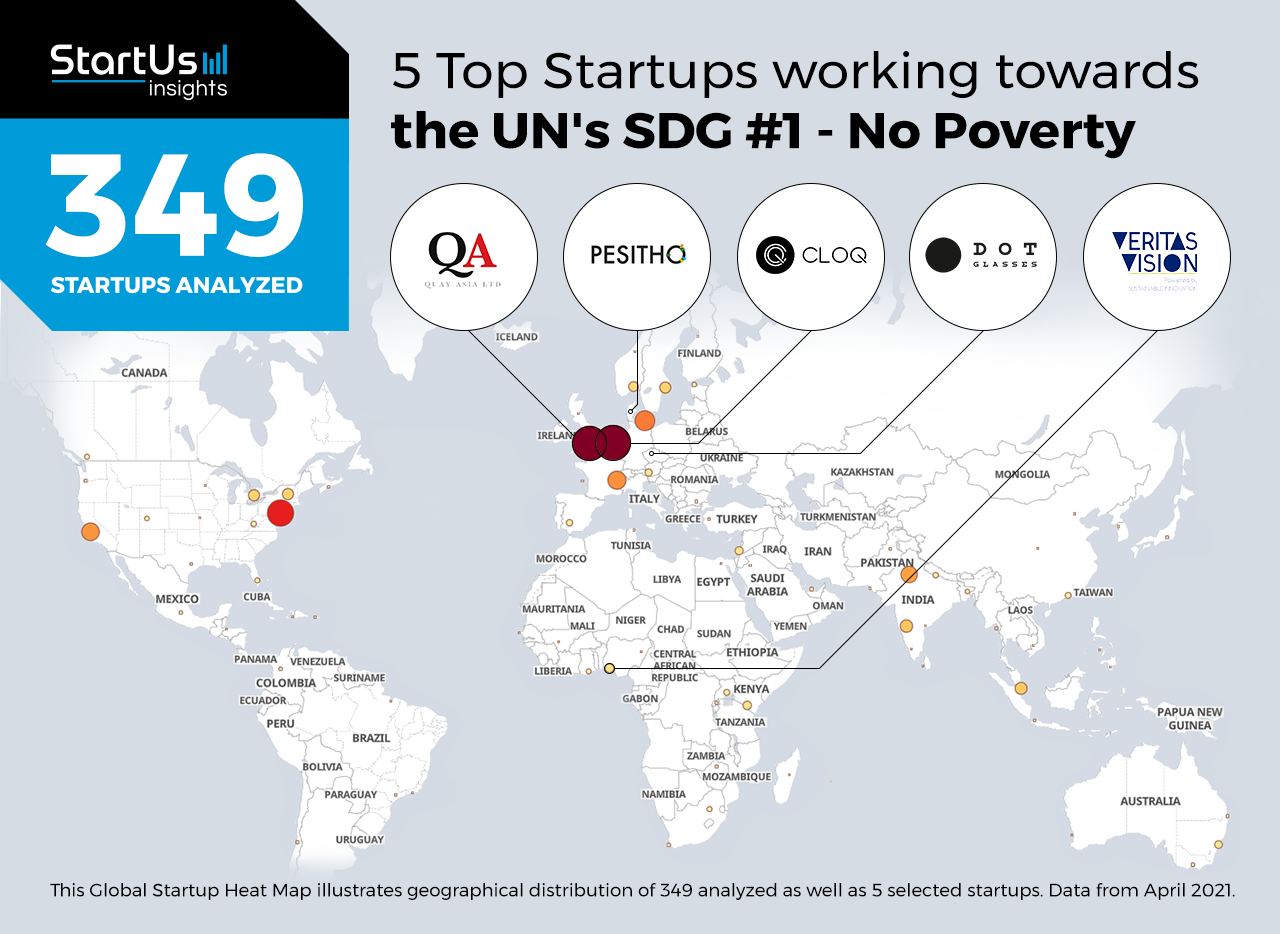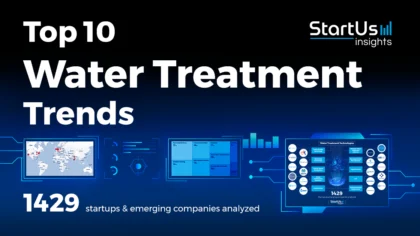Staying ahead of the technology curve means strengthening your competitive advantage. That is why we give you data-driven innovation insights. This time, you get to discover 5 hand-picked startups working towards the United Nation’s Sustainable Development Goal #1 – No Poverty.
Global Startup Heat Map highlights 5 Top Startups working towards No Poverty out of 349
The insights of this data-driven analysis are derived from the Big Data & Artificial Intelligence-powered StartUs Insights Discovery Platform, covering 2.093.000+ startups & scaleups globally. The platform gives you an exhaustive overview of emerging technologies & relevant startups within a specific field in just a few clicks.
The Global Startup Heat Map below reveals the distribution of the 349 exemplary startups & scaleups we analyzed for this research. Further, it highlights 5 startups that we hand-picked based on criteria such as founding year, location, funding raised, and more. You get to explore the solutions of these 5 startups & scaleups in this report. For insights on the other 344 no poverty solutions, get in touch.
Veritas Vision provides Access to Clean Energy
Access to reliable power supply plays a significant role in the upward economic mobility of an area. However, many regions in developing countries or remote areas are served by unreliable power grids. For such communities, off-grid solutions provide access to clean, renewable energy. This also eliminates the need for unsustainable practices for daily chores, such as cooking or cleaning.
Nigerian startup Veritas Vision provides access to clean energy. The startup offers bespoke solar solutions that meet the unique energy needs of each customer. It also offers affordable asset financing options as well as last-mile support via dedicated relationship agents that educate poor families about the advantages of renewable energy. The startup’s solutions bring solar to poor families, helping them save money and reduce emissions.
CloQ promotes Digital Financial Inclusion
Millions of people do not have access to the traditional banking system. Taking loans from informal lending channels often turns out to be debt traps, further deepening poverty. This is why FinTech startups are working on solutions that promote financial inclusion. This helps in inclusive growth, reducing poverty, and addressing income inequality.
CloQ is a Dutch startup promoting digital financial inclusion for unbanked population. It allows users to get instant loans directly into e-wallets. The startup initially lends small amounts, but it increases as the users build a positive track record. It enables poor people with a phone and internet to access low-interest nano loans and break the cycle of debt.
DOT Glasses offers Low-Cost Prescription Eyeglasses
Globally, over a billion people in need of prescription eyeglasses cannot afford them. This hurts their chances at a proper education and impacts their productivity at work, not to mention various lifestyle challenges. This is why economists consider poor vision to be a major barrier to economic progress. To address this, social tech startups are working on ways to provide low-cost prescription eyeglasses to the poor.
Czech startup DOT Glasses provides low-cost prescription eyeglasses. The startup further offers small kits for vision testing to enable brands and organizations to set up vision camps. It also includes frame components of eyeglasses and scratch-resistant polycarbonate lenses. The startup distributes its eyeglasses via multiple channels, including non-profits, micro-entrepreneur networks, and government entities. As a result, this increases the productivity and earnings of low-income people.
Quay Asia enables Private Sector Initiatives
Many developing countries in Asia and Africa have a significant demographic advantage. However, the youth from low-income families living there often lacks opportunities for economic empowerment. This gap risks turning the demographic dividend into a demographic burden. This is why social tech startups develop solutions to make such individuals ready for the job market as well as find jobs that match their skills.
British startup Quay Asia develops private sector initiatives for economic empowerment. The startup trains individuals for career moves, investments in local agriculture and manufacturing enterprises, as well as financial and economic analysis. It focuses its efforts on the poorer individuals from Asian countries, helping them land rewarding careers.
Pesitho provides Affordable Cooking Solutions
Poor families often lack basic kitchen equipment. Compounded with a lack of time, it denies many people nutritious food even if they have access to inexpensive food. Moreover, the use of wood or charcoal for cooking has adverse health and environmental impacts. This is why startups are working on safe and affordable cooking solutions for poor communities.
Pesitho is a Danish startup that develops an off-grid solution for affordable cooking. The startup’s self-contained and multi-purpose home cooking unit, ECOCA, runs on solar energy. It combines a battery pack, a solar panel array, and an insulated cooking pot. It is particularly suitable for people living in refugee camps. Lastly, it is a sustainable alternative to wood-fueled cooking and also charges smaller appliances like mobile phones.
Discover more startups
Startups such as the examples highlighted in this report focus on clean water & sanitation, zero hunger as well as climate action. While all of these technologies play a major role in advancing the UN’s SDGs, they only represent the tip of the iceberg. To explore more technologies, simply get in touch to let us look into your areas of interest. For a more general overview, you can download our free Innovation Report to save your time and improve strategic decision-making.









